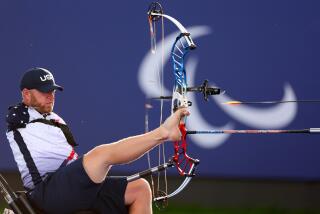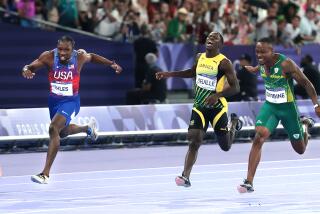Instead of No-Height, O’Brien at New Height
- Share via
ATLANTA — It was a dream deferred for Dan O’Brien and it arrived in the customary manner of the 10-event decathlon: running through the pain of memory and ignoring the pressure of expectations.
Thursday night O’Brien earned the title of world’s greatest athlete--which he was ordained to win along with the Olympic gold in 1992. But he didn’t make the U.S. Olympic team and the gold medal he earned here was born out of that failure.
Cover boy and subject of commercial hype before the 1992 Games in Barcelona, O’Brien has rarely been allowed to forget his mistake in failing to clear a height in the pole vault at the Olympic trials.
The hype resurfaced four years later and O’Brien was ready.
“I expected to be here,” O’Brien said of his winning position. “I thought about it every day. There was never a day that I didn’t think I could do it. Perseverance did pay off. I’m very glad that I stuck it out.”
O’Brien scored 8,824 points, 23 shy of Daley Thompson’s Olympic record. Frank Busemann of Germany won the silver medal with 8,706 points, a personal best. Tomas Dvorak of the Czech Republic won the bronze in 8,664, a personal best and national record. American Steve Fritz was fourth.
O’Brien said he was at peace with his past.
“I closed the door on ’92 a long time go, but a lot of other people didn’t,” he said after becoming the first American to win the event since Bruce Jenner in 1976. “I felt left out. It’s incredible to go and watch a competition you think you should have won. This is a new place to start some things in my life.”
O’Brien held a 209-point lead going into the last event, the 1,500 meters. It’s the point in the competition where the calculators have been taken out for the last time, the scoring tables are consulted and coaches tell their athletes how fast they must run the metric mile.
The final word: If Busemann could run 32 seconds faster than O’Brien, he would win the gold.
The 1,500 is the final cruel stroke of the event, having saved its most hurtful and punishing moment for last. O’Brien calls the race a “slow pain.”
It was the first 1,500 in recent memory in which O’Brien was required to work. O’Brien knew what he was in for. His best time in the 1,500 this year was 5:12.01, Busemann’s was 4:28.15.
Busemann burst to the lead, intent on his task. O’Brien settled into the back of the pack and let the runners string out in front of him. Busemann led by seven seconds after the first lap and strained to increase the margin.
Dvorak rushed past Busemann after the first lap and his burst had the effect of pulling the field along, Busemann with it. The tidal surge didn’t reach as far back to O’Brien, who was grimacing and running with great labor.
Busemann gathered himself for a final kick and made his move with 200 meters to go. O’Brien responded 80 meters later. He ended up in eighth, in 4:45.89, well within reach of Busemann’s time of 4:31.41.
It has long been an axiom in the sport that the multi-event athlete is the student of many events and the master of none. O’Brien takes it further. He won his third world championship title last year without finishing first in a single event.
“I think I’m good enough in the decathlon so I don’t have to be perfect,” O’Brien said.
He won only one of the first day’s five events. Wednesday went like this for O’Brien: 100 meters, second place. Long jump, ninth place. Shotput, fifth place. High jump, fourth place, 400 meters, first place.
It is O’Brien’s day to amass points and build a lead, which he did, with a 124-point margin.
The concern on Thursday was the pole vault, the old nemesis. To combat O’Brien’s pole vault phobia, coaches Rick Sloan and Mike Keller devised situational practices, wherein O’Brien was given a scenario and he had to vault. Last attempt, world championships, wet runway.
At the trials, it was after the pole vault that O’Brien took over the lead. On Thursday, O’Brien tied for eighth, clearing 16-4 3/4.
O’Brien said he’d hoped for more points than the 910 he got. The projections proved that. Going into the javelin, the projection was for Busemann to finish first based on his javelin and 1,500 meter times.
When O’Brien was introduced in the javelin, the crowd erupted. He stood at the end of the runway, narrowing his eyes and puffing his cheeks. His throw was good, 212 feet.
Before his last throw, O’Brien consulted former Olympian Dave Johnson, asking which javelin he should select. Johnson’s advice paid off. On his third attempt, O’Brien unleashed his best javelin throw ever, 219-6.
O’Brien celebrated, but his actions were premature. Busemann had already thrown a personal best in the event, 219-4. That gave both men 842 points in the event.
Busemann mounted his challenge by pushing the envelope in every event. The German set personal bests in three events and equaled them in two others.
Busemann moved into second and Fritz into third after a 215-6 throw. O’Brien said he needed to cushion his lead as much as possible to help him in the 1,500.
“It always comes down to the 1,500,” O’Brien said. “Always.”
Events forced O’Brien into a middle ground for Thursday’s race. Barring some kind of incredible effort from Busemann, O’Brien would not be required to run the race of his life. But neither could he jog.
O’Brien successfully found the balance required to win.
After race, runners flung themselves to the ground. Those who could still stand staggered into sweaty hugs and clapped the back of competitors they had shared two difficult days with, for the decathlon engenders a mutual respect among athletes not found in other events.
Busemann lay prone on the track, and his German teammates rushed to his side and knelt beside him. Medical personnel tended to the fallen. Wet towels were passed among the men sprawled around like litter. As usual, the finish line of a decathlon 1,500 meters looked like triage at a train wreck.
O’Brien did not even so much as squat. He raised his arms in triumph, then dropped them, exhausted from the effort. O’Brien wandered among the other decathletes, cheers rained down, and suddenly he began to cry.
More to Read
Go beyond the scoreboard
Get the latest on L.A.'s teams in the daily Sports Report newsletter.
You may occasionally receive promotional content from the Los Angeles Times.







